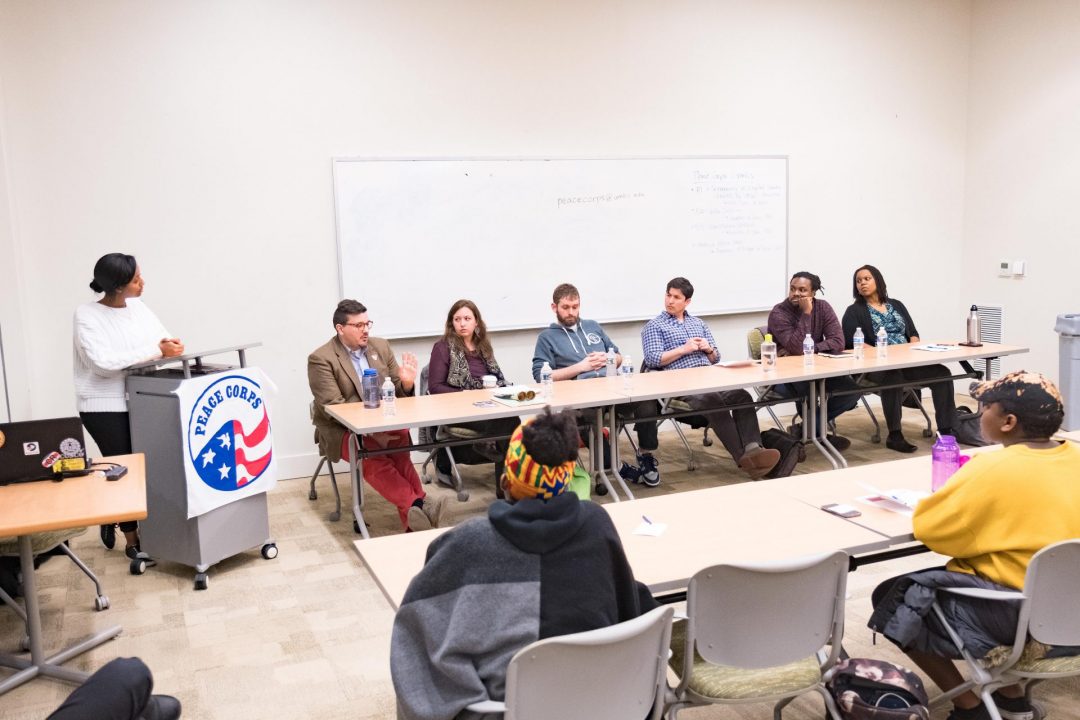With spring commencement just around the corner, the topic of post-graduation plans is on many students’ minds. Some students are being accepted to graduate schools while others are on the hunt for a job. But UMBC’s Peace Corps Prep program wants students to consider another opportunity — one that is perfect for any student with an interest in culture, public service and humanitarian aid.
According to the organization’s website, “The Peace Corps is a service opportunity for motivated change-makers to immerse themselves in a community abroad, working side by side with local leaders to tackle the most pressing challenges of our generation.” UMBC’s Peace Corps Prep program recently held a series of events called Peace Corps Week in order to generate interest and create awareness of this opportunity.
One event was a panel focused on the topic of cultural identity and what role a person’s identity plays in their service. The panel, moderated by junior health administration and public policy major Luwam Gebreyesus, included six Returned Peace Corps Volunteers: Justin Maridable-Tabor, a sustainable agriculture volunteer who served in the Philippines from 2008-2011; Alissa Harvey, an education and public health volunteer who served in the Republic of Georgia from 2010-2012; Anthony Scavone, a community economic development volunteer who served in Mali and Senegal from 2011-2014; Christopher Mullen, a sustainable agriculture volunteer who served in Guatemala from 2006-2008; Malcolm Clyburn, a community health volunteer who served in Mozambique from 2014-2016 and Heather Douglas, a community health volunteer who served in Mozambique from 2004-2007.
The panelists covered topics from the cultural norms of their host countries to the experience of living with a host family to how non-visible identities play into a volunteer’s experience. Maridable-Tabor, for example, spoke of his experience as a gay man in the Peace Corps living within a conservative household. Upon learning about his sexuality, his host family called the Peace Corps office, which then sent a representative to mediate between him and the family. Maridable-Tabor recounted: “That was, for lack of a better word, a shitty situation.”
Douglas also faced issues relating to her cultural identity while serving in Mozambique. During her service, she wore her hair in dreadlocks, which was viewed as a hairstyle worn only by homeless people and stoners. “It’s like my hair became so much more of an identity and a part of Heather than anything else that I brought to my position in Peace Corps,” reminisced Douglas.
Both female volunteers on the panel, Harvey and Douglas, struggled with sexism and gender norms while abroad. Harvey was repeatedly propositioned and proposed to. She also noted that the standards of women’s behavior, dress and habits were extremely conservative in Georgia where women were expected to remain virgins until marriage and to wear cross necklaces as signifiers of their purity.
Douglas, too, received many solicitations from men in her village, but the topic was even more complicated for her as a queer woman. However, Douglas was able to transform the difficulties she faced as a queer volunteer into learning opportunities for her fellow volunteers, eventually conceiving a program called the “Peer Support Network.” According to Clyburn, who served nearly ten years after Douglas, this program has since become an integral part of the Peace Corps’s program in Mozambique.
As for what advice the RPCVs have for interested students and future volunteers? “Be open-minded,” says Maridable-Tabor, who is also a recruitment officer for the Peace Corps. “When you apply to the Peace Corps, one of the things that people start to do is build up expectations: I want to change all these people, I want to do something meaningful.” But in reality, Maridable-Tabor says, volunteers have to learn to value their small victories and be proud of the differences they can make in even a single person’s life. “It’s very daunting to look at two years of my life [and ask,] are we doing anything? But it paid off in the end.”
Students interested in the Peace Corps are advised to contact Jaleel Johnson, UMBC’s Peace Corps recruiter, or visit peacecorpsprep.umbc.edu for more information.

